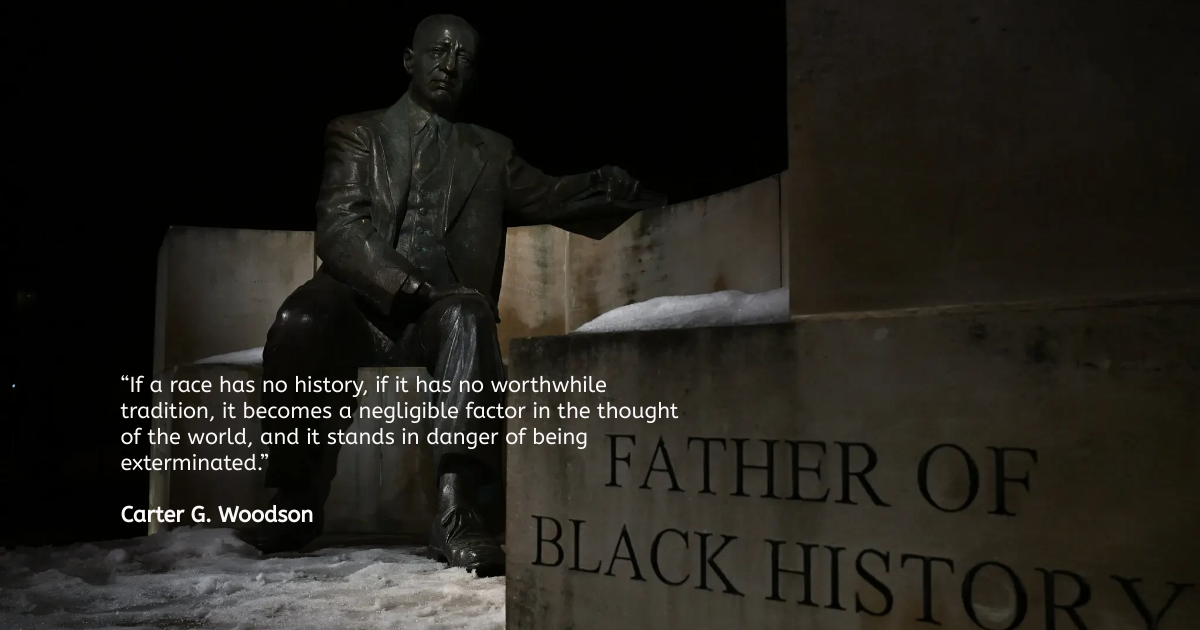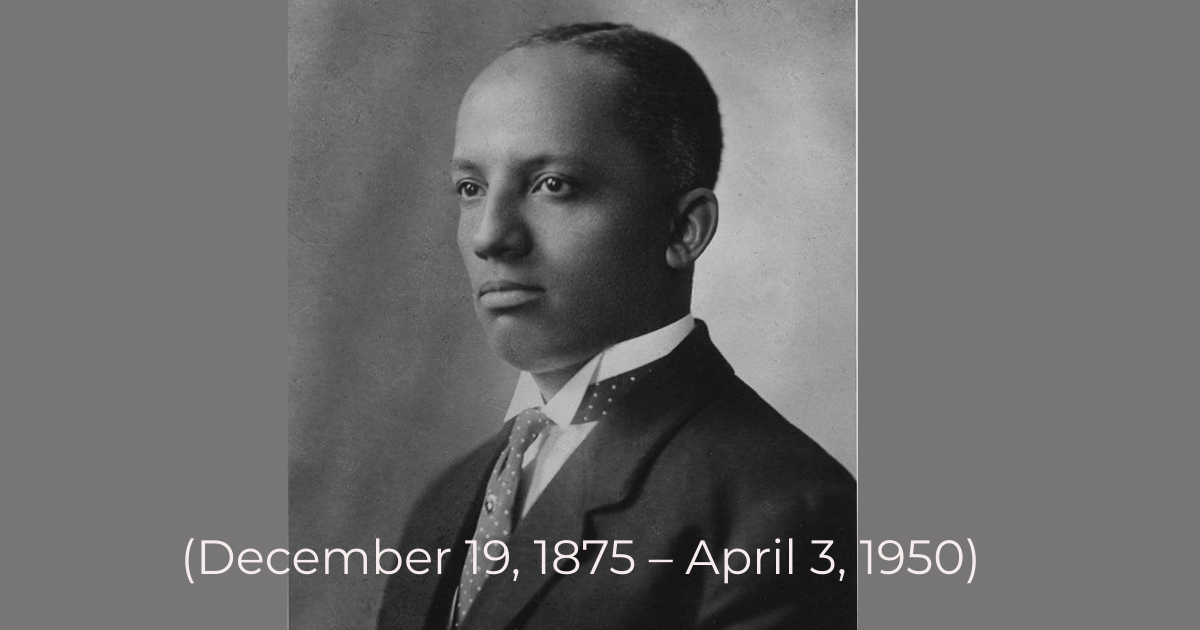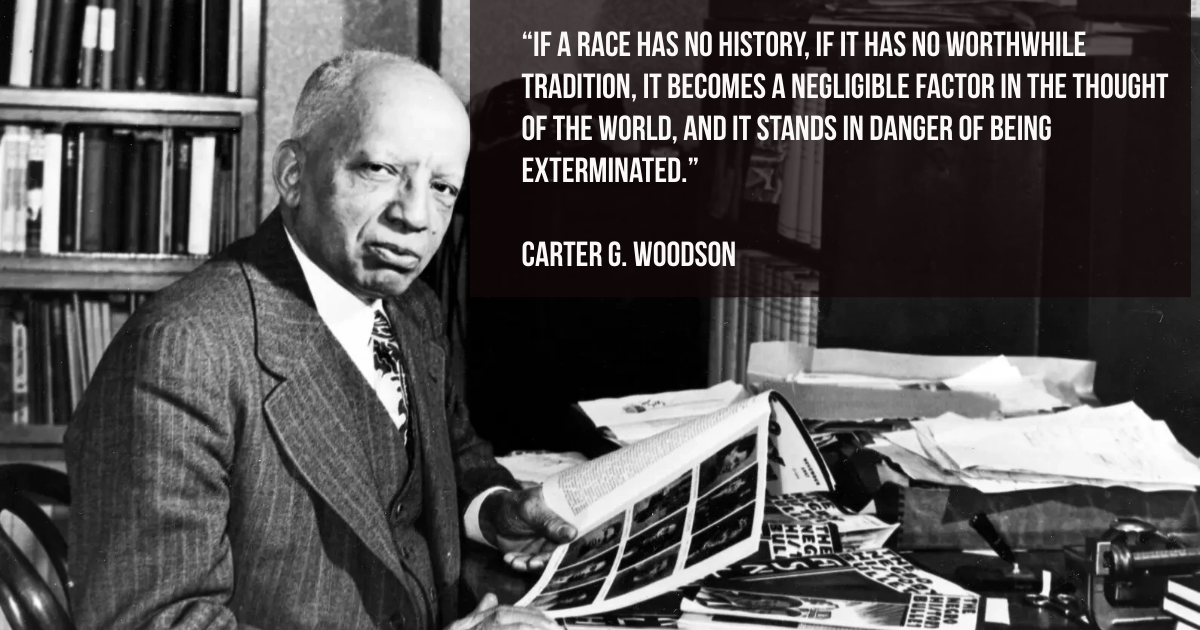Black History Quotes By Carter G Woodson:
Carter Godwin Woodson (December 19, 1875 – April 3, 1950) was an influential American historian, author, journalist, and the visionary behind the establishment of the Association for the Study of African American Life and History (ASALH). This comprehensive exploration sheds light on Woodson’s life, his significant contributions to African-American history, and his role in the creation of Black History Month.
Early Life and Education:
Born in Virginia to former slaves, Woodson faced adversity and delayed formal education to work in West Virginia’s coal mines. Despite these challenges, he graduated from Berea College and later earned graduate degrees at the University of Chicago. Woodson made history as the second African American to obtain a Ph.D. from Harvard University, a remarkable achievement considering his parents’ enslavement.
Career and Afrocentrism:
Woodson’s career primarily unfolded in Washington, D.C., where he championed the study of black history. Recognizing the lack of inclusivity in academic history, Woodson taught at historically black colleges, including Howard University and West Virginia State University. His pivotal role in shaping Afrocentrism involved placing people of African descent at the forefront of historical study.
Critique of Christian Churches:
Woodson criticized Christian churches for perpetuating limited opportunities and segregation. In his work “The Mis-Education of the Negro,” he highlighted the ineffectiveness of ritualistic churches and their failure to address the masses’ needs, contributing to racial development obstacles.
Dr. Woodson’s Home: A Hub of Scholarship:
Woodson’s residence served as the epicenter of intellectual exchange, bringing together generations of scholars, writers, and activists. This historic house at 1538 Ninth Street played a crucial role in the establishment of the ASALH and the initiation of Negro History Week, the precursor to Black History Month. The house not only served as a living space but as a creative incubator for groundbreaking ideas and initiatives.
Honors and Tributes:
Woodson received numerous accolades, including the NAACP Spingarn Medal in 1926. The Carter G. Woodson Book Award and a commemorative stamp from the U.S. Postal Service reflect his enduring legacy. The Library of Congress honored Woodson with an exhibition, and various statues and memorials commemorate his contributions across the United States.
Places Named in Honor of Woodson:
From schools to libraries and parks, numerous institutions bear Woodson’s name, honoring his legacy in states such as California, Florida, Georgia, Illinois, Indiana, Kentucky, Louisiana, Maryland, Minnesota, New York, North Carolina, Texas, Virginia, Washington, D.C., and West Virginia. These institutions stand as a testament to the widespread impact of Woodson’s work, ensuring that his memory lives on through generations.
Black History Month 2024: Significance and Celebration:
Black History Month, initiated by Carter G. Woodson, serves as a pivotal cultural celebration. In 2024, the month invites reflection on the achievements and contributions of Black individuals, emphasizing the importance of education and eradicating discrimination. As society continues to evolve, the significance of Black History Month grows, providing a platform to acknowledge and appreciate the rich tapestry of African American history.
Origins of Black History Month:
The roots of Black History Month trace back to Woodson’s home in Washington, where he founded the ASALH and initiated Negro History Week in 1926. The month-long celebration became official in 1976, recognizing the often overlooked accomplishments of Black Americans throughout history. Woodson’s home serves as a symbolic anchor for the month, a place where the seeds of celebration were first sown.
Carter G. Woodson, often hailed as the “father of Black history,” left an indelible mark through his teachings that transcended mere historical documentation. His core belief revolved around the imperative need to include people of African descent at the heart of historical narratives. Woodson’s teachings extended far beyond a conventional understanding of history; they were a clarion call to recognize the rich contributions of Black individuals throughout time.
Woodson emphasized the necessity of Afrocentrism, asserting that a comprehensive understanding of history could only be achieved by centering the experiences, achievements, and struggles of people of African descent. His teachings challenged prevailing norms that marginalized Black history, urging society to embrace a more inclusive and accurate portrayal.
A cornerstone of Woodson’s teachings was the idea that history is not a static, one-dimensional narrative but a dynamic force that shapes contemporary perspectives. He implored educators, scholars, and the general public to engage with history as a living entity that informs present-day realities. Woodson’s commitment to education extended beyond academic circles; he sought to empower individuals with knowledge that could dismantle stereotypes, challenge prejudices, and foster a deeper appreciation for the diverse tapestry of human history.
In essence, Carter G. Woodson’s teachings were a profound invitation to embark on a journey of enlightenment, fostering a collective consciousness that acknowledges the richness of Black history as an integral part of the broader human experience.
7 Key principles of Carter G Woodson
- Inclusivity and Representation:
Woodson advocated for the inclusion of people of African descent at the center of historical narratives. He believed in weaving the stories, achievements, and struggles of Black individuals into the broader tapestry of human history, ensuring a more comprehensive and accurate representation.
- Afrocentrism as a Guiding Principle:
One of Woodson’s key principles was the promotion of Afrocentrism – the perspective that places African people and their descendants at the forefront of historical study. This principle aimed to rectify historical inaccuracies and omissions, offering a more nuanced understanding of the global narrative.
- Dynamic and Living History:
Woodson rejected the notion of history as a static entity, emphasizing its dynamic nature. His teachings encouraged viewing history as a living force that shapes contemporary perspectives, fostering a continuous engagement with the past to inform present-day realities.
- Education as Empowerment:
Woodson saw education as a powerful tool for empowerment. His principles underscored the importance of providing individuals with knowledge that could dismantle stereotypes, challenge prejudices, and empower them to actively participate in shaping a more inclusive and just society.
- Challenge to Prevailing Norms:
Woodson’s teachings challenged prevailing norms that marginalized Black history. He encouraged critical examination of existing historical narratives, urging scholars and educators to reevaluate and broaden their perspectives to encompass the contributions of Black individuals.
- Living Legacy Through Recognition:
Woodson’s principles included the idea that history is not only about the past but also about recognizing and celebrating the living legacy of individuals and communities. His teachings aimed to acknowledge the ongoing impact of historical contributions in shaping contemporary society.
- Promotion of Cultural Awareness:
Woodson believed in fostering cultural awareness as a means of understanding and appreciating the diversity of human experiences. His principles emphasized the importance of recognizing and celebrating cultural nuances, contributing to a more harmonious and inclusive global narrative.
- Celebrating Black History Month:
The celebration offers various avenues for participation, including raising funds for relevant charities, championing diversity and inclusion in the workforce, and issuing inclusion statements to promote racial equality. Beyond individual efforts, corporations and educational institutions play a crucial role in fostering an environment that values and celebrates diversity throughout the year.
Carter G. Woodson’s enduring legacy extends beyond the pages of history books, with numerous institutions and events paying homage to his contributions. As Black History Month unfolds in 2024, it serves as a reminder of Woodson’s vision and the ongoing journey towards equality and recognition for Black individuals and their impact on society. Through education, celebration, and continued activism, the legacy of Carter G. Woodson lives on, shaping a future where Black history is not just acknowledged in February but integrated into the fabric of the nation’s collective narrative.
FAQs
- Who was Carter G. Woodson, and why is he significant in Black history?
Answer: Carter G. Woodson (1875–1950) was an American historian, author, and the founder of the Association for the Study of African American Life and History. Significantly known as the “father of Black history,” Woodson played a crucial role in highlighting African American contributions and initiated Negro History Week, later evolving into Black History Month.
- What led Carter G. Woodson to critique Christian churches in his work?
Answer: In his 1933 work, “The Mis-Education of the Negro,” Woodson criticized Christian churches for offering limited opportunities and perpetuating segregation. He argued that these churches did not effectively reach the masses and hindered racial development by subjecting African Americans to segregated conditions.
- How did Carter G. Woodson’s home contribute to the establishment of Black History Month?
Answer: Woodson’s home at 1538 Ninth Street in Washington, D.C., served as the headquarters for the Association for the Study of Negro Life and History. It was in this hub of scholarship that Woodson initiated Negro History Week in 1926, laying the foundation for what would later become Black History Month.
- What honors and tributes have been bestowed upon Carter G. Woodson?
Answer: Woodson received the NAACP Spingarn Medal in 1926, and a 20-cent stamp was issued in his honor by the U.S. Postal Service in 1984. The Carter G. Woodson Book Award was established in 1974, and his Washington, D.C. home is designated the Carter G. Woodson Home National Historic Site.
- How can individuals celebrate Black History Month in 2024?
Answer: To celebrate Black History Month, individuals can engage in various activities. Some suggestions include raising money for charities supporting Black communities, championing diversity and inclusion in the workforce, and issuing inclusion statements to promote racial equality. Recognizing and appreciating the contributions of Black individuals in history is also a fundamental way to participate in the celebration.
Read More >>https://trenditweetz.com/google-alphabet-q4-2023-earnings-report/






Pingback: How Did Punxsutawney Phil See His Shadow To Declare Early Spring In 2024: Folklore With A Light Disbelief